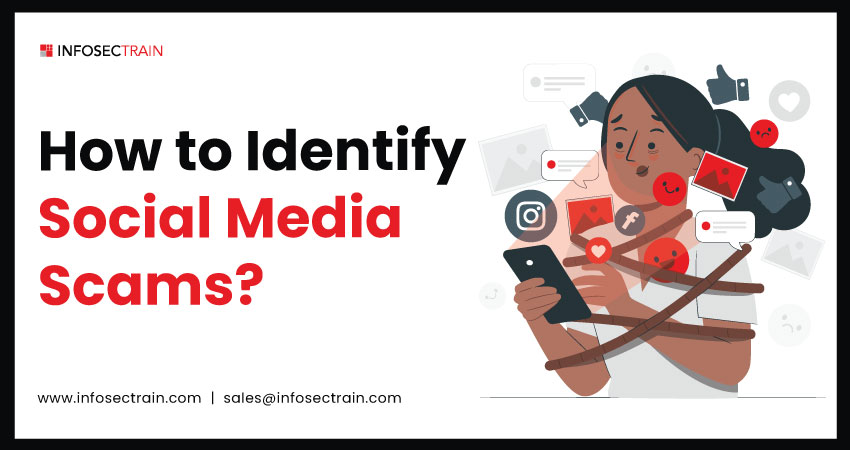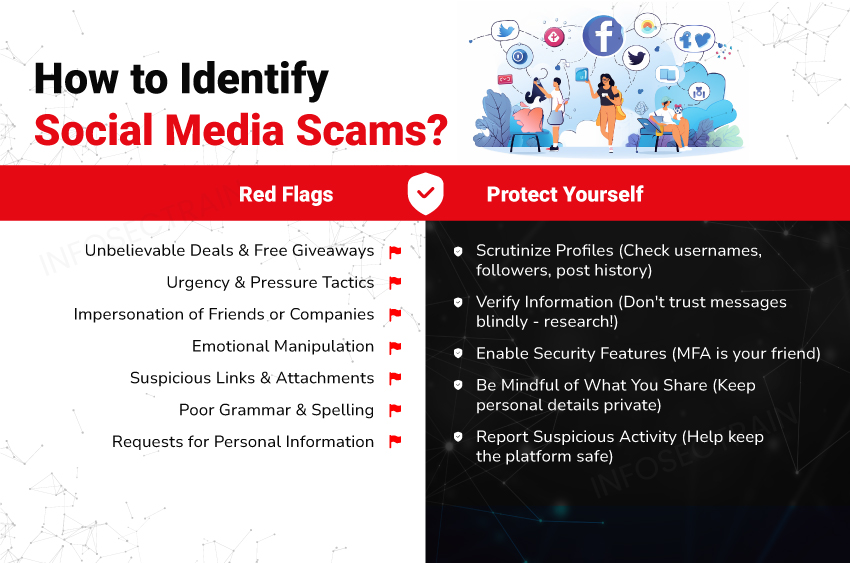How to Identify Social Media Scams?
Social media is a land of connection, entertainment, and endless scrolling. But lurking beneath the curated feeds and hilarious pet videos lie imposters – social media scammers. These tricksters aim to exploit your trust and steal your personal information, money, or even your identity.

So, how do you navigate this online landscape without falling victim to a scam? Here’s your crash course on identifying social media scams:
1. The Allure of Free Stuff and Unbelievable Deals:
Be wary of fake giveaways on social media. Scammers often lure people in with promises of free vacations, luxury giveaways, or ridiculously cheap designer goods. Remember, legitimate businesses rarely offer such extravagant deals through social media.
2. The Urgency Factor:
Scammers often create a sense of urgency. They might pressure you to act fast, claiming limited spots in a giveaway or an expiring discount code. Don’t let the clock control your decisions. Take a step back, verify the source, and research the offer before taking any action.
3. The Impersonation Game:
Scammers often impersonate trusted entities like banks, social media platforms, or even your friends. They might create fake profiles with stolen logos or hijack compromised accounts. Always double-check the profile information – look for inconsistencies in usernames, spelling errors, or a lack of mutual friends and save yourself from social media impersonation scams.
4. The Emotional Rollercoaster:
Scammers prey on your emotions. They might tug at your heartstrings with sob stories or exploit your desire for romance or connection. Be cautious of online relationships that progress quickly, especially if they involve financial requests or promises of meeting offline under suspicious circumstances.
5. The Phishing Phantoms:
Social media phishing scams are a classic weapon in the scammer’s arsenal. You might receive messages with links that appear legitimate, leading to fake login pages designed to steal your credentials. Never click on suspicious links, especially those urging you to update your account information.
Here are some additional red flags to watch out for:
- Vague or poorly written messages: Legitimate businesses typically have professional-looking content.
- Requests for personal information: Never share your Social Security number, bank details, or passwords through social media.
- Poor grammar and spelling: Professional companies generally maintain high standards for written communication.
- Pressure to download attachments: Avoid downloading attachments from suspicious messages unless you expect a file from a trusted source.

How to Protect Yourself from Social Media Scams?
- Scrutinize profiles: Check usernames, follower lists, and post history before engaging with unfamiliar accounts.
- Verify information: Don’t rely solely on the information presented in a message. Do your own research to confirm the legitimacy of an offer or promotion.
- Enable security features: Most social media platforms offer features like multi-factor authentication to enhance account security.
- Be mindful of what you share: Do not overshare personal details or financial information on social media.
- Report suspicious activity: Report any suspected scams to the social media platform and consider blocking the account.
By being cautious about what you see and click on, you can shield yourself from scams and confidently navigate the online world. Don’t let these imposters steal your hard-earned money or personal information.
Empower Yourself with InfosecTrain’s Cybersecurity Courses:
InfosecTrain offers a range of cybersecurity courses designed to equip you with the knowledge crucial for navigating online threats confidently. Whether you’re interested in learning about social engineering tactics or want to delve deeper into phishing scams, InfosecTrain has a course to suit your needs. By taking charge of your cybersecurity knowledge, you build a stronger defense against scams, safeguarding yourself and those you care about in the online world.



 1800-843-7890 (India)
1800-843-7890 (India) 
